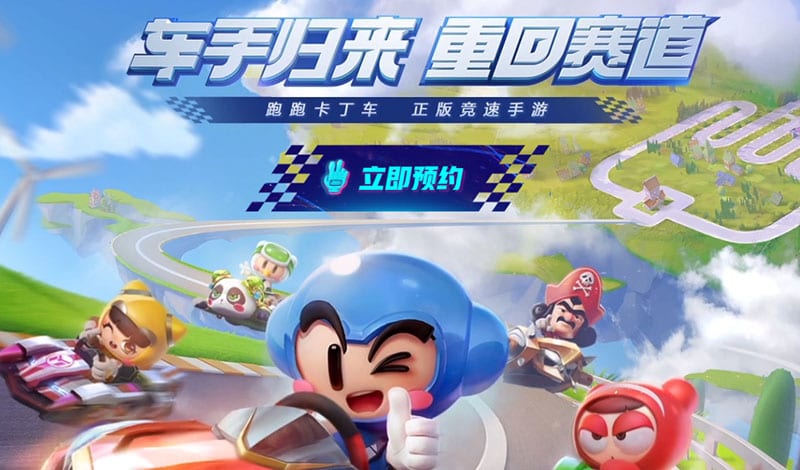
剑网3:指尖江湖 Published by Tencent in China
Tencent are leveraging on the strength of their games portfolio in a time of low supply due to more strict enforcment of China's game ISBN regulation
Tencent has recently gathered together some of its top-tier mobile games in order to leverage on the strength of this IP in negotiations with major Chinese app distribution channels. The “ask” is that these channels change the developer / channel revenue split to 70:30 for the titles in question (with Tencent taking 70% as the publisher). Most channels currently operate based on a 50:50 revenue split with the developers/publishers. However, the developer or publisher also takes the hit for additional additional percentages relating to payment channel fees (Alipay or WeChat Pay etc).
The games involved in the negotiation include “跑跑卡丁车” (or Crazy Racing) and “剑网3:指尖江湖“. Tencent is the exclusive agent for both titles and they are considered top-earning IP in the Chinese mobile gaming market.
A quick inspection of Chinese app stores offers some insight into the channel response to Tencent’s proposal.
Based on our review, in addition to being available on Tencent’s own App Store (MyApp), the two games have been published and are available for download on the Huawei, Xiaomi, and 360 stores. Immediately after Tencent presented their new terms, download of the games via these same channels was disabled. Thus it would appear normal service has resumed indicating that agreement has been reached with Tencent. However, when reviewing the game pages on OPPO’s App Store, only the logo and metadata for both titles remain. Game download is disabled with a message stating “Game download is temporarily unavailable due to operation related changes”. Industry analysts speculate that this suggests that the proposed new deal (70:30 revenue split) has not been accepted by OV Stores (OPPO and Vivo).
The motivations behind Tencent’s “tough” new stance in relation to revenue split are simple. Firstly, Tencent has further bolstered its strong position in the mobile game publishing business. Based on the “2018 China Gaming Industry Report”, Tencent accounted for 65.2% of the top earning 50 games in 2018. Meaning that more than half of the revenue made by the top 50 games was generated by Tencent’s publishing business. Furthermore, with the more active enforcement of the game ISBN regulation / approval process, that is now tightly controlled by China’s State Administration of Radio, Film and Television (SARFT)), there was a substantial decrease in the supply of games to the market, reports show that the number of games which gained ISBN decreased from around 10000 in 2017 to 1100 in 2018, marking a roughly 90% decrease. In other words, the pool of legitimate games available to app store channels in China are becoming fewer and fewer, weakening the position of channels who themselves are not directly publishing top-tier titles.

“跑跑卡丁车” (Crazy Racing) Published by Tencent in China
However, the so called “HMOV Hardcore Alliance” (Huawei, Xiaomi, OPPO and Vivo) accounts for 86% of the Android mobile device market share. Based on IDG’s report, HMOV sold over 300 million devices to the market, and although their App stores are not yet ranked as high as “independents” like 360 and Tencent’s MyApp, their App Stores offer some natural advantages, such as app pre-installs, better access to lower levels of the device OS etc. (e.g. the device manufacturers own app stores do not need special permissions to install from “unknown sources”) Considering this, if the alliance’s growth continues, Tencent may have to backtrack on its new 50:50 revenue share policy in coming years.
2019 presents a number of challenges for both mobile gaming and the mobile device market in China. Thus a power struggle between dominant content providers, such as Tencent, and distribution channels seems inevitable.
BACKGROUND INFORMATION
In China, 3rd party App Stores which act as mobile content gateways, fall into two distinct categories:
- Software companies lead by BAT (Baidu, Alibaba, Tencent) and 360.
- Major device manufacturer, also known as HMOV alliance (Huawei, Xiaomi, OPPO and Vivio).
On the mobile gaming front, the distribution channel obviously plays an important role, and during the years of strong growth experienced by mobile networks in China, 3rd party app stores also reaped the rewards, leading to fierce competition for user traffic, with mobile games being weaponised to pull in users. In the early years of smartphone adoption in China, the channel/developer revenue split was sometimes 70:30, or even 80:20 in extreme cases, with the app store channels claiming the lion’s share.
In 2014, Alibaba Group’s USD 5 billion acquisition of UC marked the giant’s high profile entrance into the mobile app store market. In a bid to gain developer allegiance and a pipeline of games, 9Game, an App Store controlled by UC (and thus Alibaba) announced an 80:20 developer/publisher revenue split, giving a far greater share to the developer than ever before. Endeavouring to cling to their market share, other small App Stores followed suit with a 90:10 in developer/publisher split. It seemed like a new era had begun, where developers had more power.
That was until later the same year. In August 2014, the “Hardcore Alliance” lead by Huawei, OPPO, Vivo, Lenovo and other device manufacturers realised their natural advantages in terms of a captive audience, and announced their entrance to the already packed App Store market. Previously, these device manufacturers were more focused on hardware margin and battling each other to reduce the cost of their devices. They paid no attention to the App Store dimension, leaving the App Store selection to the user after purchase of the device. With the exception of Xiaomi. Modeling itself on apple, Xiaomi were forward thinking enough to get in the App Store game early.
The “Hardcore Alliance” entrance to the App Store bar fight has been described as “brutal and efficient”. Firstly, users no longer needed to install 3rd party App Stores onto their phones. Secondly, even where users installed their “preferred” 3rd party App Stores, the manufacturer’s OS utilities often performed a “security scan” of Apps downloaded from such 3rd party App Stores, and pushed users in the direction of “safer” app download alternatives (of the same app(s)) from the manufacturer’s App Store embedded on the device.
This was probably the beginning of the end in terms of the massive App Store fragmentation that saw many hundreds of “app stores” battling for attention in China. After a roller-coaster journey for app and game developers, once again the “Channel is King” mantra was the order of the day in the Chinese mobile gaming and App business.
There was little that developers and publishers could do in response to these newly formed alliances. Even leading companies like Tencent and NetEase were caught off guard. Based on a study carried out in 2017, NetEase’s employees admitted that only 2 of their top gaming IP had achieved a 70% split deal in their favour, other S level games (top-tier games) were all operating under a 50:50 revenue split with the App Store distribution channels. Tencent also tried to negotiate better deals for a some of the IP they operated in Chia, but this was only successful in the case of the highly popular PUBG.
Tencent, as both a publisher and a distribution channel (MyApp) has dominated the mobile gaming and app market for many years. However, Talkingdata’s report in June 2018 suggested that its market share had been dropping.
The reduced pipeline of games due to the strict SARFT ISB Process has given Tencent some additional leverage as a publisher based on strong IP during this time of high demand and low supply. However, the balance of power may well swing back to the device manufacturer app store channels as the game approval process becomes more efficient and some of the backlog of ISBN applications is cleared.
[Article Source from 36Kr @https://36kr.com/p/5224680]
